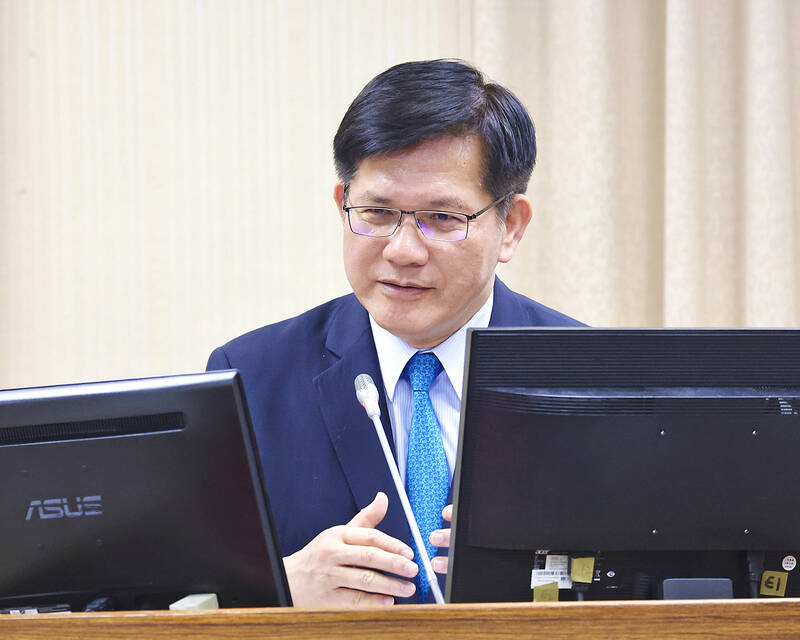Taiwan has the right to join international bodies and establish diplomatic relations with other countries as UN Resolution No. 2758 does not involve Taiwan, Minister of Foreign Affairs Lin Chia-lung (林佳龍) said on Thursday.
Lin made the statements regarding the Ministry of Foreign Affairs’ efforts to increase support for Taiwan in the international community to enable its participation in international bodies.
Lin said that the ministry would continue to build international support for Taiwan’s participation in international bodies and fight against the misinterpretation of UN Resolution No. 2758.

Photo: CNA
The UN Assembly passed Resolution 2758, in 1971, which said that the assembly recognized the People’s Republic of China as “the only lawful representatives of China” to the international body.
The issue of Taiwan’s sovereignty or representation at the UN was beyond the resolution’s purview, he said.
To exclude the nation from the UN and its affiliate organizations, Beijing has been erroneously asserting that the resolution expressed an opinion on Taiwan’s sovereignty.
Democratic Progressive Party Legislator Puma Shen (沈伯洋) asked what tangible actions were being undertaken to address the resolution’s misinterpretation, to which Lin said that the US has researched the resolution’s legal integrity and communicated with “third parties, including ones that have and do not have official diplomatic ties” with Taiwan.
The Liberty Times (sister paper of the Taipei Times) on Sunday reported sources as saying that two US Department of State assistant secretaries had recently visited Taiwan, met with foreign representatives from 20 countries in Taiwan and told them that UN Resolution 2758 does not involve Taiwan nor should it be conflated with China’s “one China” principle.
Lin said that the interpretation of UN Resolution 2758 has been twisted, with many countries not aware that the resolution does not bar Taiwan from participating in international organizations or establishing diplomatic relations with other nations.
Citing the original resolution, Lin said it only decided to “expel forthwith the representatives of Chiang Kai-shek” at the UN, and did not mention Taiwan.
If Taiwan does not react, China’s use of legal warfare to make it an “internal” matter in the eyes of the international community would be successful, Lin added.
Lin compared China’s interpretation of the UN Resolution 2758 to the so-called “1992 consensus” and said that if no one bothered to look into the claims, they would be led to the erroneous belief that they had substance.
Lin said Taiwan has been excluded from the UN network due primarily to China’s willful misinterpretation of the resolution and the UN bowing to Beijing’s pressure.
Beijing has also seeded a significant number of officials within the international body and has been donating extensively to specific projects within the UN, which has further led UN agencies to either side with China or look the other way, Lin said.
The “1992 consensus” — a term that former Mainland Affairs Council chairman Su Chi (蘇起) in 2006 admitted making up in 2000 — refers to a tacit understanding between the KMT and the Chinese Communist Party that both sides of the Taiwan Strait acknowledge that there is “one China,” with each side having its own interpretation of what “China” means.

Taiwan is to commence mass production of the Tien Kung (天弓, “Sky Bow”) III, IV and V missiles by the second quarter of this year if the legislature approves the government’s NT$1.25 trillion (US$39.78 billion) special defense budget, an official said yesterday. Commenting on condition of anonymity, a defense official with knowledge of the matter said that the advanced systems are expected to provide crucial capabilities against ballistic and cruise missiles for the proposed “T-Dome,” an advanced, multi-layered air defense network. The Tien Kung III is an air defense missile with a maximum interception altitude of 35km. The Tien Kung IV and V

The disruption of 941 flights in and out of Taiwan due to China’s large-scale military exercises was no accident, but rather the result of a “quasi-blockade” used to simulate creating the air and sea routes needed for an amphibious landing, a military expert said. The disruptions occurred on Tuesday and lasted about 10 hours as China conducted live-fire drills in the Taiwan Strait. The Civil Aviation Administration (CAA) said the exercises affected 857 international flights and 84 domestic flights, affecting more than 100,000 travelers. Su Tzu-yun (蘇紫雲), a research fellow at the government-sponsored Institute for National Defense and Security Research, said the air

A strong continental cold air mass is to bring pollutants to Taiwan from tomorrow, the Ministry of Environment said today, as it issued an “orange” air quality alert for most of the country. All of Taiwan except for Hualien and Taitung counties is to be under an “orange” air quality alert tomorrow, indicating air quality that is unhealthy for sensitive groups. In China, areas from Shandong to Shanghai have been enveloped in haze since Saturday, the ministry said in a news release. Yesterday, hourly concentrations of PM2.5 in these areas ranged from 65 to 160 micrograms per cubic meter (mg/m³), and pollutants were

Taiwan’s armed forces have established response protocols for a wide range of sudden contingencies, including the “Wan Chun Plan” to protect the head of state, the Ministry of Defense (MND) said today. After US President Donald Trump on Saturday launched a series of airstrikes in Venezuela and kidnapped Venezuelan President Nicolas Maduro, concerns have been raised as to whether China would launch a similar “decapitation strike” on Taiwan. The armed forces regularly coordinate with relevant agencies and practice drills to ensure preparedness for a wide range of scenarios, Vice Minister of National Defense Hsu Szu-chien (徐斯儉) told reporters before a